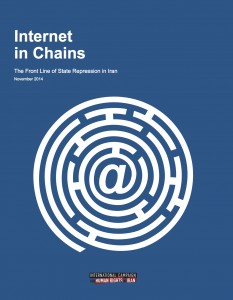Authorities’ Ability to Monitor Online Communications Will Increase
Internet in Chains
November 19, 2014—The Rouhani administration should use all its authority to end the government’s initiatives to restrict Iranians’ access to the Internet, immediately cease state efforts to monitor users’ online accounts, and end the prosecution of individuals for their peaceful online activities, the International Campaign for Human Rights in Iran said today.
In a 49-page report released today, Internet in Chains: The Front Line of State Repression in Iran, the Campaign reveals the technological initiatives, policies, and practices underway in Iran that will profoundly violate Iranians’ right to access information, freedom of speech, and right to privacy. It includes a detailed description of ongoing efforts to implement a National Internet.
“The Iranian government’s huge investment in the National Internet is motivated by its growing realization that as Internet users proliferate in Iran, the State’s grip on the social and cultural narrative inside the country is rapidly loosening,” said Hadi Ghaemi, Executive Director of the Campaign.
“The rich diversity of Iranian life that has been revealed on social networks is deeply threatening to the rigid and sterile norms and values that the government and state media have imposed on the Iranian people for decades. The Internet terrifies Iran’s deep state,” he added.
Internet in Chains: The Front Line of State Repression in Iran provides groundbreaking analysis, covering the following topics:
Presents a comprehensive analysis of the country’s National Information Network (Iran’s government-controlled domestic Intranet, also referred to as the National Internet) and all its components such as the national SSL certificates, operating system, browser, and related services.
Details how these tools will work together to give the authorities control over Internet access and the ability to access any content flowing across the National Information Network.
Reviews the state’s filtering activities, including its focus over the last year on mobile applications.
Covers the intensifying prosecution of Internet professionals and activists through collaboration between the FATA cyber police, the Cyber Army, the Revolutionary Guards, and the Judiciary.
Analyzes the political tug of war over Internet freedom between the Rouhani administration and hardliners ensconced in the judicial, intelligence, and security arms of the state and backed by the Supreme Leader Ali Khamenei.
The implementation of Iran’s National Internet, in the absence of a legal framework to protect individual privacy, will mean that Internet users in Iran will be sharing their information with the country’s security, intelligence, and judicial agencies.
“In cyberspace we are routinely warned by our browsers and applications to strengthen our passwords and secure our privacy. So the idea that Iranian authorities are securing an ‘all access pass’ to online information by essentially turning those browsers and applications into spyware is bold in its delivery, and ominous in its implications,” said Ghaemi.
The Internet has emerged as one of the central battlegrounds between authorities in Iran who wish to control access to information and expression in the country and the citizenry who desire free expression and engagement with the modern world.
In light of the technological initiatives discussed and revealed by the report, the Campaign:
Calls upon the Government of Iran to not allow the developing technological infrastructure in the country to be used to stamp out dissent. Iran’s Internet policies should not be determined by its intelligence and security agencies.
Commends the Rouhani administration for finally allowing the provision of 3G and 4G mobile services in the country, significantly increasing Internet access speeds on mobile devices, and urges the Rouhani administration to follow up with additional measures critical to providing broadband Internet access throughout the country.
Calls on the technology community to assist Iranian civil society in the development of technological tools that will counter state repression and the monitoring of Iranians’ online content.
Urges governments around the world to address the issue of Internet censorship and the persecution of Internet professionals and online activists directly with the Iranian government, and integrate concerns for Internet freedom fully into all bilateral relations, in accordance with the UN resolution in 2012 declaring that Internet access is a universal right and that freedom of speech therein must be fully guaranteed and protected.
Calls on private sector companies to pursue the legal sale of personal communications technology tools and services to Iranian citizens, but to pursue commercial relations with Iran in a manner that does not in any way facilitate the Iranian government’s censorship of the Internet or its monitoring of online activities.

